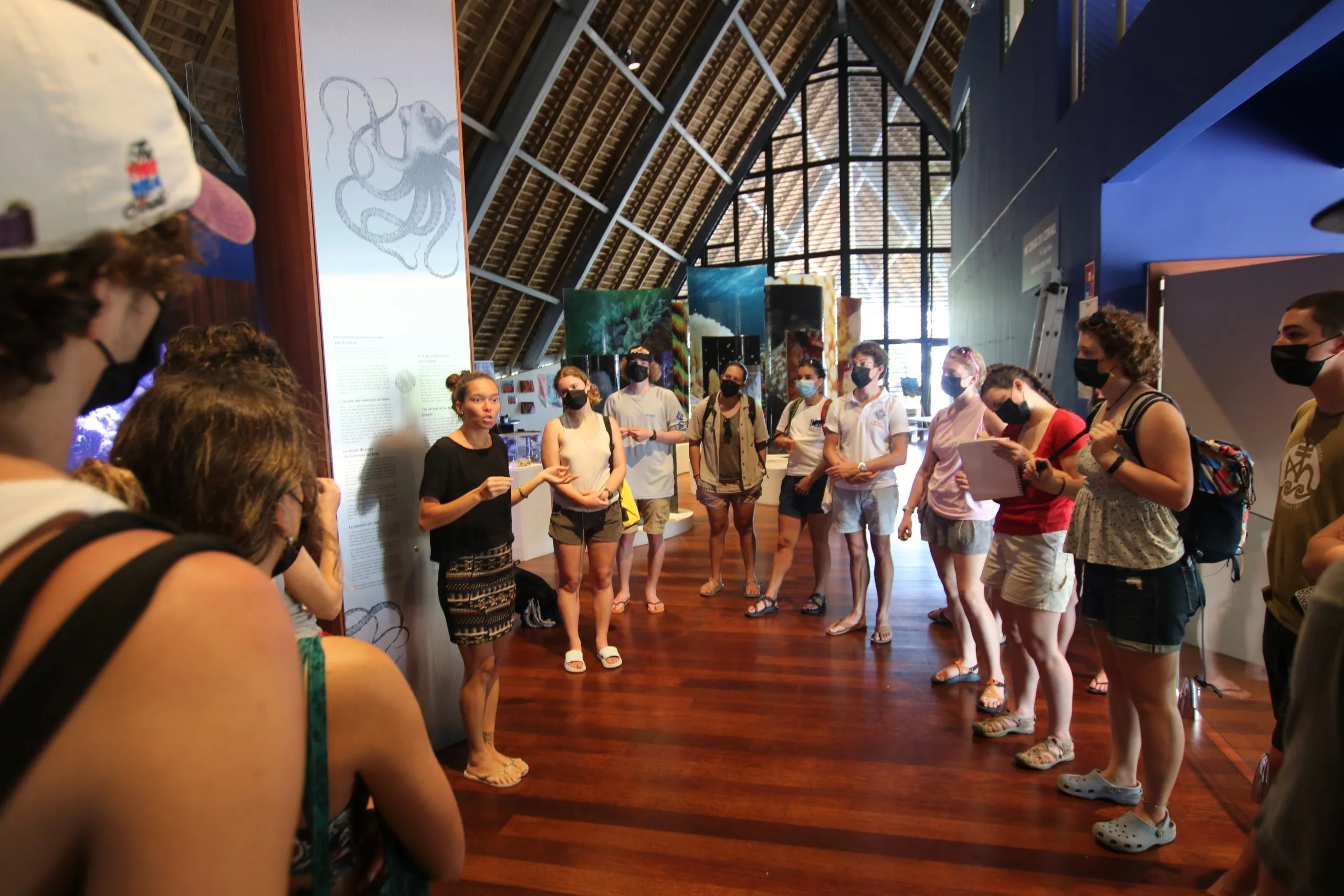Programs Blog
One door closes another door opens

Mikki Korodimou
https://sea.edu/wp-content/uploads/2023/02/Feb-24_02-welcome-scaled.jpghttps://sea.edu/wp-content/uploads/2023/02/atSEA-54.jpg
Today marks a transition for S307. We have finished with the shore component in Mo’orea and this afternoon were waved goodbye by our gracious hosts at Berkeley Gump station. Reflecting on the week last night at dinner, Jen, proposed we all go around and say something we are grateful for. Listening to the very diverse forms that the shared gratitude took, I realized two things- first, how much we have been able to do with our short time on the island. Second, the myriad of ways in which experiential education, really does, quite literally, bring to life the academic goals of an educational program such as ours.
Setting out in January, the aims of S307 were both ambitious and broad. The climate and society program aspires to provide students with an understanding and overview of climate change and its impacts that both highlight and value the entangled nature of science, social sciences, and humanities. Over the last week, I have been watching the students experience and engage in a beautiful coming together of disciplines, topics, ideas, and people that has exemplified that the best way of learning about interdisciplinarity is to live and practice interdisciplinarity.
None of this would have been possible without the kind and welcoming nature of all the people and communities who have shared their work, lives and stories to us. A few examples that stood out in the gratitude session last night included learning about the interdisciplinary work of the CRIOBE research centre, who offered shared insights about their work in developing the Rahui system of community managed resource use, gave us a tour of the Fare Nature eco museum and showed us around their labs, where we learnt of their work that brings together marine sciences with legal, linguistic and cultural fields. This experience was complemented well by a talk from Jean Wencelius, an environmental anthropologist, who shared insights about the struggles and successes of trying to incorporate community members into marine biodiversity monitoring. Having had a few days of reef surveys where the students each collected data on their own species of fish, it was really helpful to be reminded of the ways that understanding about a topic can happen from a variety of perspectives and how your own data collection can not only be complemented, but also enriched by bringing in insights from further afield.
In line with this, one very important interaction that we were fortunate enough to have this week was with Hinano and Frank Murphy from the Atitia Centre and the Tetiaroa Society. Hinano Murphy spoke to us about the intricate ways that her culture does not separate humans from nature, and how there is a deep and embedded understanding of interconnections between people, land, sea and life. Seeing the students reflect upon this and begin to slowly question their own place in the complex web of life was really what I felt very grateful for last night. As an educator, I feel there is a particular kind of sweetness, in starting to see in your students the beginnings of not needing your input and guidance and truly exhibiting in themselves, all that you want for them.
Mo’orea found us fresh eyed, somewhat jet lagged, and very excited, we left her licked by the sun, perhaps more thoughtful and certainly ready for the next stage. As we got ready to head to the ferry, the staff from the Gump station came to bid us goodbye and presented us with a parting gift of shell necklaces. With their offering they explained that in Polynesian culture, you offer a necklace of flowers when someone arrives, and a necklace of beads when someone leaves – representing that they will, one day return. And so, we headed to the ship, happy that this was not quite the end of our story here but excited to continue with the next chapter at sea!
by Mikki Korodimou
Recent Posts from the Ships
- Ocean Classroom 2024-A collaborative high school program with Proctor Academy
- Collaborations and Long-term Commitments: SEA’s Caribbean Reef Program Sets a Course for Coastal Programs that Compliment Shipboard Experiences.
- Sea Education Association students prepare for life underway using state of the art nautical simulation from Wartsila Corporation.
- SEA Writer 2022, Magazines From the Summer SEA Quest Students
- Technology@SEA: Upgrades Allow Insight into Ocean Depths
Programs
- Gap Year
- Ocean Exploration
- High School
- Science at SEA
- SEA Expedition
- SEAScape
- Pre-College
- Proctor Ocean Classroom
- Protecting the Phoenix Islands
- SPICE
- Stanford@SEA
- Undergraduate
- Climate and Society
- Climate Change and Coastal Resilience
- Coral Reef Conservation
- Marine Biodiversity and Conservation
- MBL
- Ocean Exploration: Plastics
- Ocean Policy: Marine Protected Areas
- Oceans and Climate
- Pacific Reef Expedition
- The Global Ocean: Hawai'i
- The Global Ocean: New Zealand